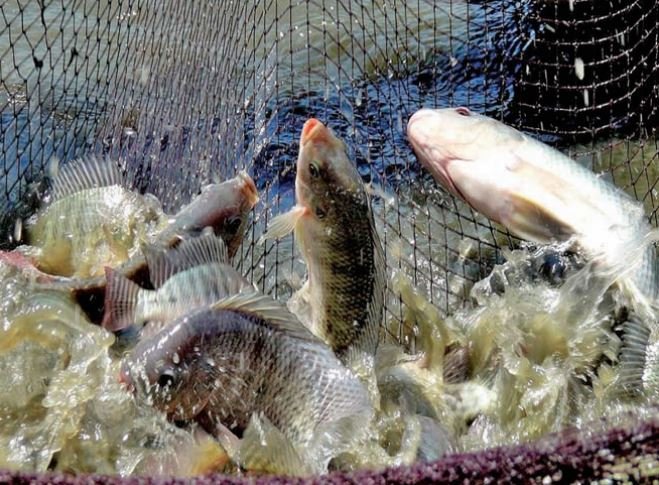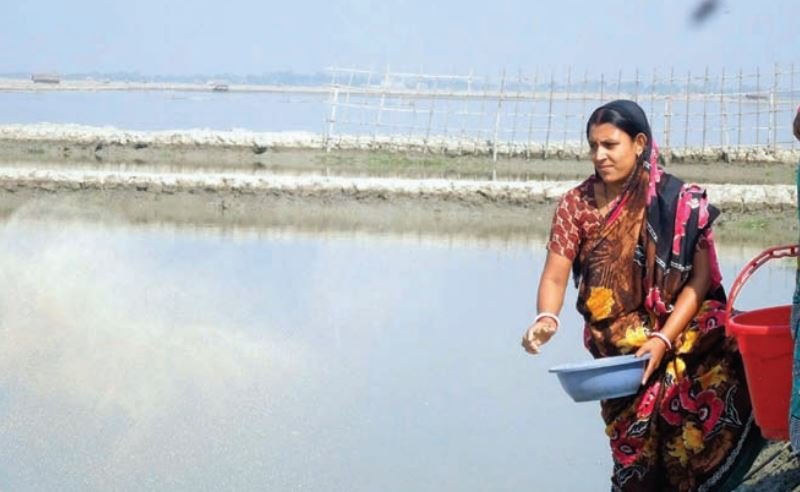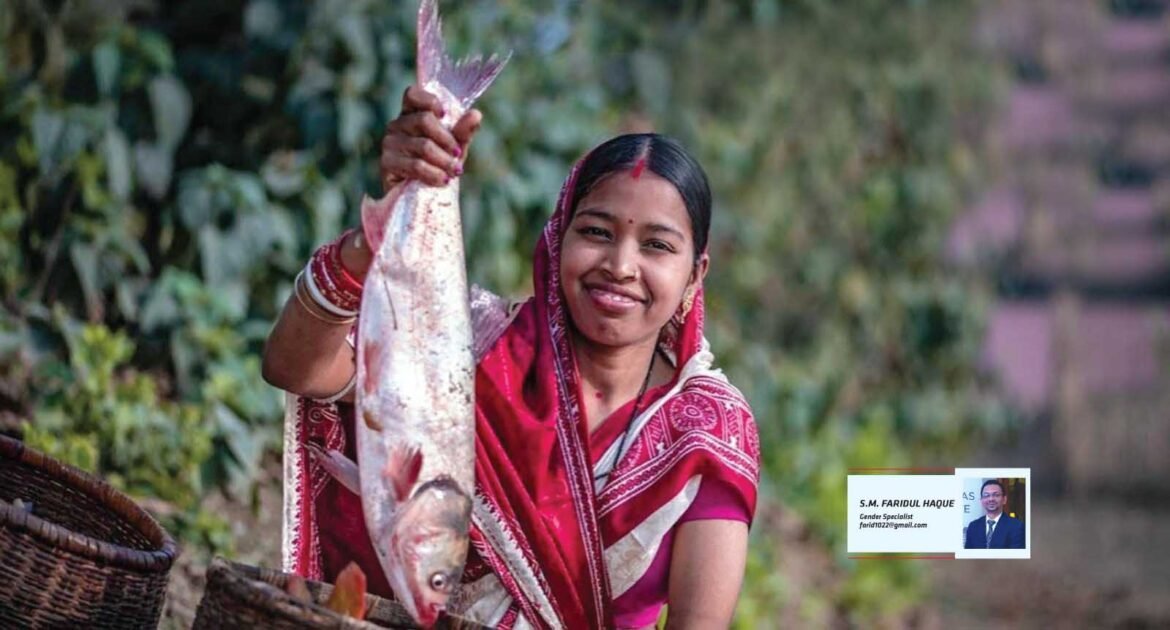Bangladesh, despite being one of the top fish-producing nations globally, women’s involvement in fish farming and related commercial activities remains significantly low. Recent research indicates that only 7.9% of the nearly 1.8 million people employed in the fisheries sector in Bangladesh over the past decade were women (Choudhury et al., 2017). Several factors contribute to the limited participation of women in this sector. Social norms perpetuate the belief that fish farming is primarily a man’s job, leaving little room for women’s engagement.
Additionally, women often lack the necessary capital and ownership of land, specifically ponds, which are vital for fish farming. The location of commercial fish farms far from residential areas poses logistical challenges for women, making it impractical for them to oversee and manage distant ponds. Furthermore, social and cultural barriers restrict women’s mobility, as patriarchal values control their freedom of movement in rural areas. Consequently, women are unable to actively participate in profitable and productive fish farming, even if they or their families desire their involvement.
GOVT’S ROLE IN PROMOTING WOMEN’S EMPOWERMENT THROUGH FISH FARMING PROJECTS
Recognizing the need to empower women through fish farming, the government of Bangladesh has the opportunity to make significant strides in this area. From 1997 to 2019, a total of 19,878 shelterbased projects (Ashrayan projects) were implemented across the country, benefiting 154,238 families (GOB, 2021). The government has set a target to resettle an additional 32,225 families and construct 6,445 barracks by June 2022 (GOB, 2021).
Many of these shelter-based projects include: ponds within their premises, primarily utilized by the project residents for fish farming. However, due to prevailing social norms, male household members often control the entire process, excluding women’s participation even though the shelter-based projects are registered in the joint names of husband and wife as co-owners. To address this issue, the formation of women-led fish farming groups and the provision of appropriate training can actively involve women in fish farming activities within these projects. This approach not only creates opportunities for women’s empowerment but also helps overcome the barriers that hinder their participation.

Since the ponds are conveniently located within household premises, women can manage them alongside their daily chores. Collectively engaging in fish farming allows for the division of responsibilities, ensuring a fair distribution of work. If women’s access to ponds is ensured in shelter-based projects, it has the potential to directly benefit approximately 200,000 families, enabling 50,000 to 70,000 women to engage in income-generating activities.
INNOVATIVE WOMEN-LED INITIATIVE IN TARAGANJ: SOCIAL POND MANAGEMENT PROGRAM
WorldFish, an international research organization piloted -a groundbreaking women-led pond management initiative in Taraganj Upazila, Rangpur district. A group of 22 women from the Hatibandha shelter-based project actively participated in this “Social Pond Management Program Led by Women.” This program aims to empower women through fish farming and achieve multiple outcomes:
- Empowering women through fish farming
- Enhancing women’s social status and decision-making capacity
- Developing women’s entrepreneurial skills through group activities
- Improving the productivity and marketability of small-scale women fish farmers
- Creating an inclusive value chain for disadvantaged and landless women
- Generating productive employment and attractive job opportunities for marginalized communities
- Increasing women’s knowledge about food diversity and nutrition
- Bringing about a social mindset change regarding women’s involvement in fish farming
This women-led aquaculture initiative commenced in February 2021 and continued until December 2022. WorldFish employees, along with support from the Rangpur district and Taraganj Upazila administrations, worked tirelessly to ensure the success of this program. The women’s group has formed an executive committee to implement the “Social Pond Management Program Led by Women,” and pond rejuvenation was done by the committee. The women have actively managed invasive plants in the pond, ensuring its proper care.

Around 36 kilograms of fish fingerlings, including Rui, Catla, Tilapia, and Mola species, have been released into the pond. With proper care, the fish are estimated to yield at least 3 lakh taka in sales. The women themselves were responsible for selling the fish, and efforts are underway to establish connections with local supermarkets to facilitate collaboration. The women’s group has received training on fish farming, and an advisory committee comprising five experienced male individuals from the area has been formed to provide guidance when needed.
This inclusive approach has boosted the confidence of women in the Taraganj shelter project, as evident from the statement of Beauty Aktar, the chairperson of the “Social Pond Management Program under Women’s Leadership,” who expressed her commitment to empowerment, saying, “I am releasing fish in the pond for empowerment, even if I cannot swim.”
DRIVING SOCIAL CHANGE THROUGH WOMEN’S INVOLVEMENT
While the evaluation of the Taraganj initiative is yet to take place, the goals and objectives of the “Social Pond Management Program under Women’s Leadership” hold significant importance. To eliminate gender disparities and establish equality in society, it is crucial to involve women in various income-generating activities and challenge gender biases regarding women’s work. Women’s active engagement in fish farming and related commercial activities can be a catalyst for this transformation.
By allocating ponds to women’s groups in shelter-based projects, progress toward poverty alleviation, food security, good health, gender equality, and inclusive economic development can be accelerated. With the ownership and independent utilization of the main resource for fish farming in the hands of women, positive change can be expedited, benefiting individuals, families, and communities at large.


